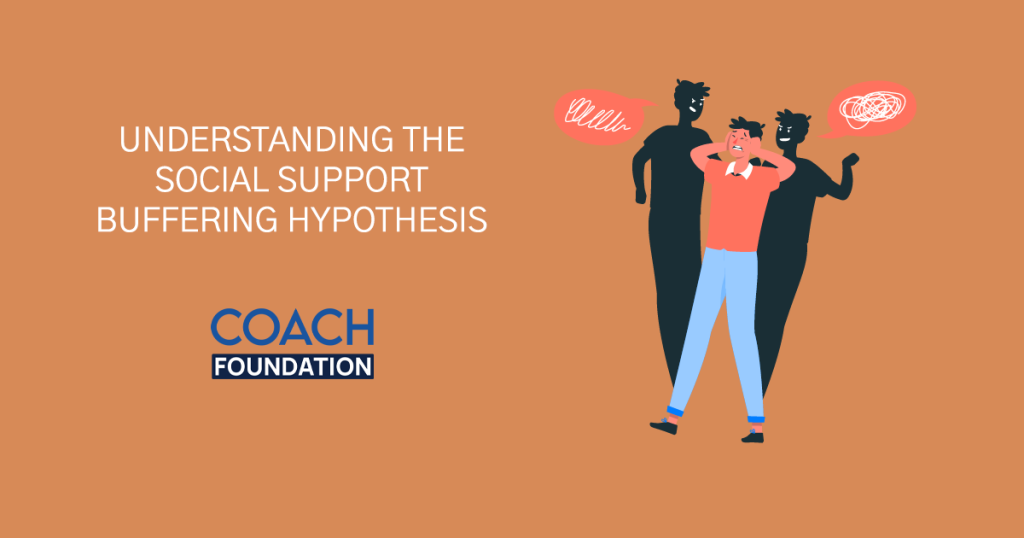Blog » Coaching Models and Techniques » Understanding The Social Support Buffering Hypothesis
Understanding The Social Support Buffering Hypothesis
The Social Support Buffering Hypothesis is a theoretical concept that suggests that social support can help individuals cope with stressful situations and buffer against the negative impacts of stress on physical and mental health. In simple terms, the theory suggests that having a strong support system in place can help people better handle difficult situations and lead to improved overall well-being.

The social support buffering hypothesis has been extensively researched and has been found to be an effective means of dealing with stress.
This theory has important implications for life coaching, where understanding the role of social support and how to effectively apply it can be crucial in helping clients achieve their goals and improve their well-being.
In this article, we are going to learn the meaning of the social support buffering hypothesis, its core concepts, influencing factors, and more.
- Understanding The Social Support Buffering Hypothesis
- What is the Social Support Buffering Hypothesis?
- How does the social support buffering hypothesis work?
- Core concepts of social support buffering hypothesis
- Factors affecting social support buffering hypothesis
- Effects of social support buffering hypothesis
- Pros and cons of social support buffering hypothesis
- Applying social support buffering hypothesis to life Coaching
- Conclusion
- Frequently Asked Questions (FAQs)
What is the Social Support Buffering Hypothesis?
The Social Support Buffering Hypothesis is a theory that suggests that social support can help individuals cope with stressful situations and reduce the negative impact of stress on physical and mental health.
Social support can come from a variety of sources, including family members, friends, coworkers, and even online communities.
According to the theory, the effectiveness of social support depends on its quality, the type of stressor, and individual differences. The quality of social support refers to how supportive and caring the people in one’s social network are.
The type of stressor refers to the nature of the stressor, whether it is a chronic stressor, an acute stressor, or a traumatic stressor. Individual differences refer to personal factors such as age, gender, personality, and coping style.
To learn more, give this video a shot!
How does the social support buffering hypothesis work?
The Social Support Buffering Hypothesis works by providing individuals with resources to help them cope with stressors. Social support can come in many forms, such as emotional support, tangible support, informational support, and companionship support.
Emotional support involves providing comfort, encouragement, and empathy to help individuals deal with their emotions. Tangible support involves providing practical assistance, such as help with daily chores or financial support.
Informational support involves providing advice and guidance on how to handle stressful situations. Companionship support involves having someone to share activities with and provide a sense of belonging.
The effectiveness of social support depends on the quality of the support, the type of stressor, and individual differences.
For example, high-quality emotional support may be more effective for coping with acute stressors, while tangible support may be more effective for coping with chronic stressors.
Core concepts of social support buffering hypothesis
In the realm of life coaching, where personal growth and well-being take center stage, understanding the core concepts of the social support buffering hypothesis holds immense value. This hypothesis serves as a guiding framework that highlights the transformative potential of social support in navigating life’s challenges and fostering resilience.
By delving deeper into the core concepts of this hypothesis and exploring their relevance to life coaching, we can unlock new avenues for empowering individuals to overcome obstacles and lead fulfilling lives.
At its essence, the social support buffering hypothesis proposes that individuals who have access to supportive networks can effectively mitigate the negative impact of stress, adversity, and uncertainty.
It asserts that the presence of social support provides a buffering effect, shielding individuals from the detrimental consequences of life’s hardships. By understanding the core concepts underlying this hypothesis, life coaches can harness its principles to create a nurturing and growth-oriented environment for their clients.
Factors affecting social support buffering hypothesis
Within the realm of social support and its impact on well-being, it is essential to explore the various factors that influence the effectiveness of the Social Support Buffering Hypothesis. While social support has been identified as a protective factor, the degree to which it buffers individuals from the negative effects of stress and adversity can vary based on several key factors.
By delving into these factors, we can gain a deeper understanding of the nuanced dynamics at play within the social support buffering hypothesis and its practical implications for coaching and support systems.
1. Quality of social support
The quality of social support is one of the most important factors affecting the effectiveness of the social support buffering hypothesis. High-quality social support involves supportive, caring, and empathetic relationships that provide individuals with a sense of belonging and emotional security.
2. Type of stressor
The type of stressor is another important factor that affects the effectiveness of social support. Different types of stressors may require different types of social support. For example, acute stressors may be best managed with emotional support, while chronic stressors may require tangible support.
3. Individual differences
Individual differences such as age, gender, personality, and coping style can also affect the effectiveness of social support. For example, individuals who are more extroverted may benefit more from social support than introverted individuals. Additionally, individuals who have more positive coping styles, such as problem-solving or positive reframing, may be better able to use social support effectively than those who use less effective coping strategies.
Effects of social support buffering hypothesis
Exploring the effects of the social support buffering hypothesis allows coaches to tailor their support strategies to maximize the benefits for their clients. By understanding the mechanisms through which supportive networks exert their influence, coaches can facilitate the development of robust support systems that nurture and empower aspiring entrepreneurs.
1. Improved Physical Health
One of the main benefits of the social support buffering hypothesis is improved physical health. Studies have shown that individuals who have strong social support networks are less likely to develop health problems such as cardiovascular disease, hypertension, and chronic pain. Social support can also help individuals recover more quickly from illnesses or injuries.
2. Enhanced Coping Ability
Another benefit of the social support buffering hypothesis is enhanced coping ability. Social support can provide individuals with a sense of belonging and emotional security, which can help them better manage stressful situations. By providing practical and emotional resources, social support can help individuals develop effective coping strategies that can be used to manage future stressors.
3. Improved Overall Well-being
Social support can also lead to improved overall well-being. Studies have shown that individuals who have strong social support networks have higher levels of life satisfaction, happiness, and positive affect. Social support can also reduce feelings of loneliness, depression, and anxiety.
Pros and cons of social support buffering hypothesis
In the realm of psychological well-being and personal growth, the social support buffering hypothesis has emerged as a significant concept. This hypothesis posits that social support plays a crucial role in mitigating the negative effects of stress and adversity on an individual’s mental health.
Understanding the pros and cons of the social support buffering hypothesis is vital for coaches who aspire to help their clients build resilient and thriving businesses. By exploring both the benefits and limitations of this hypothesis, coaches can effectively tailor their support strategies to enhance their clients’ success.
Pros of the Social Support Buffering Hypothesis
By recognizing the positive aspects of this hypothesis, coaches can harness its potential to create a nurturing and growth-oriented environment for their clients. Understanding these pros will enable coaches to optimize the support they provide, foster the development of robust business foundations, and empower their clients to navigate obstacles with resilience.
1. Improved Physical Health
The social support buffering hypothesis has been found to have positive effects on physical health. Studies have shown that individuals who receive social support are more likely to recover from illness or injury faster than those who do not.
Furthermore, social support can reduce the risk of developing certain illnesses such as heart disease, diabetes, and cancer. This is because social support can reduce stress and promote healthy behaviors such as exercise and a healthy diet.
2. Enhanced Coping Ability
Another major benefit of the social support buffering hypothesis is that it can enhance an individual’s coping ability. When individuals are faced with stressors, they are more likely to be able to cope with them effectively if they have social support.
Social support can provide emotional support, problem-solving assistance, and positive feedback that can help individuals feel more capable of handling stressful situations.
3. Improved Overall Well-being
The social support buffering hypothesis has also been linked to improved overall well-being. Studies have shown that individuals who receive social support report higher levels of life satisfaction and happiness than those who do not.
Additionally, social support can reduce the risk of depression and anxiety, which are common mental health issues that can negatively impact an individual’s quality of life.
Cons of the Social Support Buffering Hypothesis:
While the social support buffering hypothesis holds significant promise, it is essential for coaches to be aware of its limitations. Acknowledging the cons of this hypothesis equips coaches with a comprehensive understanding of its boundaries and potential pitfalls.
1. Quality of Social Support
One potential drawback of the social support buffering hypothesis is that the quality of social support matters. In order for social support to be effective, the recipient must consider it helpful.
If the support is perceived as unhelpful or even harmful, it can actually increase stress and worsen outcomes. Therefore, it is important for individuals to receive high-quality social support from sources that they trust and feel comfortable with.
2. Type of Stressor
Another potential limitation of the social support buffering hypothesis is that it may not be effective for all types of stressors. For example, social support may not be as effective for chronic stressors such as financial problems or ongoing health issues.
Additionally, the type of stressor may impact the type of support that is most helpful. For instance, emotional support may be more helpful for relationship stressors, whereas instrumental support (e.g., practical assistance) may be more helpful for job-related stressors.
3. Individual Differences
Individual differences can also impact the effectiveness of the social support buffering hypothesis. For example, some individuals may be more likely to seek out social support than others. Additionally, personality traits such as extraversion and neuroticism can impact the effectiveness of social support.
Individuals who are more extraverted may benefit more from social support, whereas individuals who are more neurotic may be more sensitive to the quality of social support they receive.
Applying social support buffering hypothesis to life Coaching
Understanding the Social Support Buffering Hypothesis is important for life coaches, as it can help them better support their clients in managing stress and achieving their goals.
Coaches can help their clients identify their sources of social support and work on building and strengthening those relationships. Coaches can also help their clients develop effective coping strategies that utilize social support.
When working with clients, it is important for coaches to consider the quality of social support, the type of stressor, and individual differences. By understanding these factors, coaches can tailor their approach to meet the unique needs of each client.
Conclusion
In conclusion, the social support buffering hypothesis offers valuable insights into the ways in which social support can positively influence individuals’ lives. By recognizing its significance and implementing strategies to enhance social support within coaching practices, coaches can effectively support their clients in navigating challenges, promoting personal growth, and achieving their goals.
Understanding and applying the principles of the social support buffering hypothesis can ultimately contribute to the establishment of successful coaching businesses that prioritize the well-being and progress of clients.
Frequently Asked Questions (FAQs)
1. What is the concept of the social support buffering hypothesis?
An example of emotional support would be providing comfort and empathy to a friend who has recently gone through a difficult breakup. An example of informational support would be providing resources and advice to a coworker who is struggling with a work-related problem.
2. What are a few examples of the social support buffering hypothesis?
Some examples of the social support buffering hypothesis include providing emotional support to a friend who has experienced a traumatic event, offering tangible support to a family member who is dealing with a chronic illness, or joining an online community for individuals who are going through a difficult time.
3. Can online social support be as effective as in-person social support?
While face-to-face social support has been found to have greater benefits for mental health and well-being, online social support can still be effective in providing emotional and informational support.
Research suggests that online social support can be particularly helpful for individuals who are unable to access in-person social support, such as those with physical disabilities or those who live in remote areas.

ABOUT SAI BLACKBYRN
I’m Sai Blackbyrn, better known as “The Coach’s Mentor.” I help Coaches like you establish their business online. My system is simple: close more clients at higher fees. You can take advantage of technology, and use it as a catalyst to grow your coaching business in a matter of weeks; not months, not years. It’s easier than you think.
AS SEEN ON





